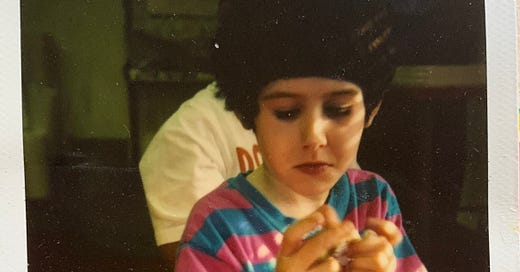Autism and the Wonderful World of Autistic Stimming - What IS Autistic Stimming and WHY do Autistic People Stim?
Stimming is essential, helpful, and necessary, but I didn't understand it for most of my life.
Welcome to Founding Member Friday! Every other Friday a post like this one will be brought to you by and for our Founding members.
The first half of this post is FREE to everyone here on Substack and the second half of the post is ONLY available to our founding members (as a thanks for the extra support they give to make this blog possible).
We currently have 4 founding members. I won’t put them on the spot here today, but you know who you are. I can’t thank you enough for your support. This one is for you.
When I discovered I was Autistic, all the little pieces of my life finally began to fall into place. For the first time, I had answers to questions about why I am the way I am, and stimming was a big piece of my personal puzzle.
Stimming explained my troubles in school with teachers who wanted me silent and immobile (and why I could not provide the stillness that was demanded of me).
Stimming explained my hunger and constant need for sensory input, why pinwheels and other sensory tools had always been my favorite toys growing up, and why I still loved so many of these items just as much as an adult.
People can be cruel to those who are different. Even without knowing I was Autistic growing up, the other kids picked up on something in how I moved, communicated, and maneuvered through the world. They bullied me, harassed me, and called me names (Twitch Witchy, Creepy Chris-, weirdo, freak). In reflection, my stims were likely one of the big things the other kids saw, as I didn't know how to hold them in when I first started school.
As an adult, I'd become a good chameleon, disconnected from my body and tense (because tense and still was the alternative to loose and stimming).
My stims evolved from jumping, spinning, and screaming (things that got me into trouble in childhood, that I still do from time to time even now, are frowned upon as adult behavior by many) have evolved into stims that are more "socially acceptable" keeping me safe from judgment and harassment from less than understanding onlookers (pacing, chewing, toe-tapping, small finger gestures in a pocket or under a table out of sight, visually stimming with anything within the eye line of the project I should be looking at, listening to music with headphones repeating a minimal selection of one song or album on a loop for hours on end).
Knowing I'm Autistic has given my stimming context, meaning, and appreciation. I've learned that stimming, something I once considered an annoyance and felt a lot of shame over (since I was teased and scolded for it), is essential. It's part of who I am and serves a great and beautiful purpose in my life as an Autistic Person living in an overwhelming and often hostile world.
What IS Autistic Stimming?
According to the National Autistic Society, stimming or "self-stimulating behaviour includes arm or hand-flapping, finger-flicking, rocking, jumping, spinning or twirling, head-banging and complex body movements."
That's a medical definition of stimming. I like to look at Autism and Autistic People from a more balanced human experience and perspective.
Stimming, for me, is like breathing, something I do naturally. Like my breath, I can hold my stims, restricting myself tight, winding and bottling everything up, but eventually, the pressure builds, and the pinned-up energy must escape.
Stimming, when left to flow and not withheld, is the human body's natural way of regulating energy when emotions, sensations, or discomfort is high.
Everybody stims, but Autistic People stim MORE.
I want to point out that the world is more uncomfortable and stressful for Autistic people than non-autistic people (because non-autistic people designed the world for themselves). Venturing into the NeuroTypical world, my senses are on high alert, ready for the inevitable assault on the senses. Anxious and excited, I enter the world with the pressure of a shaken Coke bottle.
Charged by the anxiety and sensory stress, like one of those solar sunflower toys, my body begins to move subconsciously as my energy (emotional and sensory) levels rise, or I find myself visually stimming with plants and leaves outside the windows.
Through movement or sensory seeking, I can regulate, get excess energy out, relax, deflect my nerves, and release some tension and discomfort. Stimming is essential, helpful, and necessary, but I didn't understand it for most of my life.
Substack Founding Members have access to the rest of this post.



